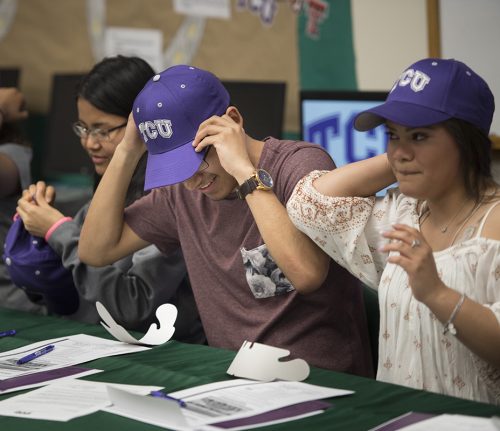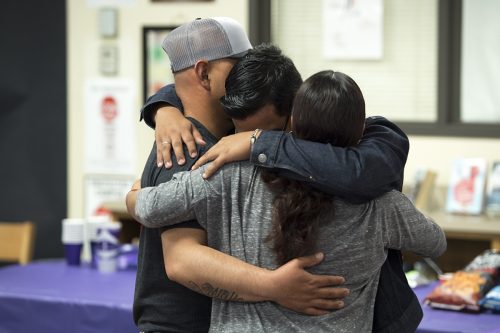Michael Ferrari’s Vision for Diversity
The former chancellor’s plans to shift demographics inspired an academic scholarship.
Michael Ferrari’s Vision for Diversity
The former chancellor’s plans to shift demographics inspired an academic scholarship.
When Michael Ferrari became TCU’s chancellor in 1998, the university had been more than 90 percent white since its inception.
Ferrari, who came from Iowa, brought plans to shift the demographics and make the student body more inclusive, more reflective of the surrounding community and larger world.
“In his first major speeches, he talked about the importance of diversity,” said Cornell Thomas, professor of education. After hearing the new chancellor discuss the impending change, Thomas requested an audience.
“The first question [Ferrari] asked … was why do minority leaders in this city call TCU a white, racist, elitist institution?” said Thomas, who held leadership roles in several organizations in Fort Worth. “I told him that I would not answer that question, but I could set up a series of luncheons and dinners, small groups of those minority leaders, and they will tell you.”

At Trimble Tech High School, just a few miles from the TCU campus, a new class of Community Scholars is welcomed. From left, Mikayla Wilson, Niang Muang and Gisselle Galvan. Photo by Leo Wesson
Thomas organized several meetings between Ferrari and community leaders, including with Rosa Navejar, who met with the new chancellor when she was president of the Fort Worth Hispanic Chamber of Commerce.
A racially diverse student body is “so important because people need to see themselves in higher education,” she said. “They need to be able to see that they, too, can achieve.”
Navejar remembered telling Ferrari that many smart local Hispanic students were leaving Texas because out-of-state universities were offering better financial-aid packages.
Thomas, however, heard less diplomatic stories from people who felt that not only was TCU prohibitively expensive to working-class families, but that it was also outright unwelcoming to the city’s ethnic- and racial-minority students.
An administrator at Fort Worth’s North Side High School showed Thomas a list of where the school’s strongest students were attending college. It contained Ivy League schools and Stanford University. No North Side graduates were at TCU.
After months of listening to people in the local community, Ferrari told Thomas he was ready to implement practical change to increase the racial and ethnic diversity of the university’s student body.
“ ‘What can we do? I want to do something now,’ ” Thomas recalled the chancellor saying.
An immediate answer was ready. Thomas; Sandra Ware, former dean of admissions; and Barbara Herman ’91 PhD, associate vice chancellor for student affairs, had drawn up a scholarship plan before Ferrari arrived on campus.

Brandon Carrasco Ballinas embraces his parents, Gabriel Carrasco and Sandra Ballinas, after he received an academic scholarship during the Community Scholars Program’s ceremony in April at Polytechnic High School in Fort Worth. Photo by Leo Wesson
The proposal’s premise was simple: TCU would “adopt” a few Fort Worth high schools, including O.D. Wyatt, Diamond Hill-Jarvis and North Side, then invite students to apply through the university’s regular admissions process and offer scholarships to a select group who met rigorous academic standards. Ferrari agreed to the strategy.
In Fall 1999, TCU began accepting applications for the first group of Community Scholars. The university’s financial-aid office was hammering out budget details, so Thomas didn’t know how many of the 12 finalists could receive the new academic scholarship.
Despite such unfinished details, Thomas offered all 12 finalists the scholarship, figuring a campuswide effort could “backfill” any funding gaps.
During dinner at a chandelier-lit downtown hotel for the finalists and their families, Michael “Mike” Scott ’83 (MBA ’04), director of scholarships and financial aid, announced the evening’s surprise: All 12 finalists earned full academic scholarships, becoming the first class of Community Scholars.
“They all started crying,” Thomas said. “I heard somebody behind me crying, and I turned around and it was the chancellor’s wife.”

Your comments are welcome
Comments
Related reading:
Features
Community Scholars Bring New Perspectives
Scholarship program opens up a world of possibilities to North Texas’s underserved elite students.
Letters
Community Scholars Represent the Promise of Broader Goals
From Chancellor Boschini: TCU has undergone a significant campus transformation in recent years that extends beyond new facilities.
Features
A man on a mission
Former chancellor Michael R. Ferrari oversaw Commission on The Future of TCU, helped author the university mission statement and got school ready for the 21st century.